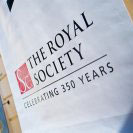 Dr Jason Chin, from the Division of Protein and Nucleic Acid Chemistry (PNAC) at LMB, has been chosen to present the annual Francis Crick Lecture for the Royal Society on 26 November 2009.
Dr Jason Chin, from the Division of Protein and Nucleic Acid Chemistry (PNAC) at LMB, has been chosen to present the annual Francis Crick Lecture for the Royal Society on 26 November 2009.
In his Francis Crick prize lecture entitled “Reprogramming the code of life”, Dr Jason Chin will discuss the invention and synthetic evolution of new orthogonal translational components (including ribosomes and aminoacyl-tRNA synthetases) to address the major challenges in re-writing the central dogma of biology.
He will discuss the application of the approaches he has developed for incorporating unnatural amino acids into proteins and for investigating diverse biological processes, with a particular emphasis on understanding the role of post-translational modifications.
Dr Mariann Bienz, Joint Head of PNAC congralutated him: “I was hugely pleased to hear that Jason was chosen to deliver the Francis Crick Lecture. This is the first time that this prestigious prize has been awarded to an LMB scientist. It will be a very special occasion indeed.”
Dr Chin is an expert in synthetic biology at LMB and a Fellow in Natural Sciences at Trinity College, Cambridge. He defines synthetic biology as a field trying to understand the principles by which cells and organisms can be rationally engineered. It’s not just about building new molecules, such as humanised antibodies; it’s about stringing together entire biochemical or signalling pathways inside cells to produce predictable outputs.
Of his work, Chin says: “We are expanding the paradigm Crick described, such that the heritable information in DNA is used not just to encode proteins, but proteins containing new unnatural amino acids and ultimately completely unnatural polymers.”
The Francis Crick Lecture is a prize lecture of the Royal Society established in 2003 with an endowment from Sydney Brenner, the late Francis Crick’s close friend and former colleague. It is delivered annually on a topic in the filed of biology, particularly the areas in which Francis Crick worked (genetics, molecular biology and neurobiology), as well as theoretical work. Importantly, the lectureship is aimed at younger scientists.
This lecture will be webcast LIVE on the Royal Society website.